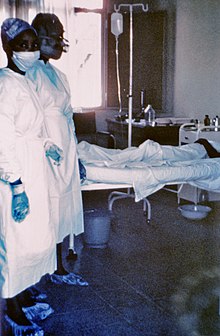1976 Zaire Ebola virus outbreak
The first recorded case was from Yambuku, a small village in Mongala District,[1] 1,098 kilometres (682 mi) northeast of the capital city of Kinshasa.
The river runs along the border on the south side of the country, which was important in the context of the Ebola epidemic because it separated the areas geographically.
By 5 September, Lokela was in a critical condition with profuse bleeding from all orifices, vomiting, acute diarrhea, chest pains, headache, fever, agitation, and confusion.
A report from the World Health Organization (WHO) noted that "almost all subsequent infections had either received injections at the hospital or had had close contact with another case.
"[10] Shortly after family members had prepared his body for burial, in accordance with local customs, 21 of Lokela's friends and relatives all fell seriously ill and 18 later died.
After the initial Ebola virus disease cases, the hospital was unable get more resources until the Minister of Health sent out an International Commission to investigate further.
On 15 September, the first doctor to arrive, Mgoi Mushola, prepared a report in which he noted that none of the many treatments provided met with success.
Because of the uncertainty of the infection route, the team placed a quarantine over the region of the Bumba Zone that was most concerning within two days after the hospital's closure in October.
The motivation for this quick quarantine was largely due to the intense nature of the symptoms and rapid progression of this disease.
The team noted that the cases had distinct patterns when drawn out into an epidemic curve that showed a clear correlation between the disease and women between the age of 18 and 25.
[11] Peter Piot, a microbiologist and physician who investigated the ensuing epidemic, concluded that it was inadvertently caused by the Sisters of Yambuku Mission Hospital, who had given unnecessary vitamin injections to pregnant women in their prenatal clinic without sterilizing the needles and syringes.
Belgian nuns serving the community were also infected, and two of them died, along with Mayinga N'Seka, a Zairean nurse, after the group was transported to Kinshasa.

